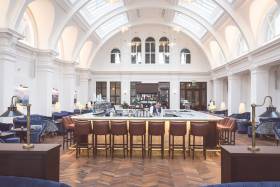Displaying items by tag: World Travel Awards
The Titanic Hotel in Belfast has been awarded the title of 'Northern Ireland's Leading Hotel 2019' at the World Travel Awards.
The hotel writes The Belfast Telegraph was given the award at a ceremony in Madeira, Portugal on Sunday evening.
The awards honour excellence within the hotel industry and the standard of service the hotel has demonstrated to visitors throughout the year.
Titanic Hotel’s General Manager Adrian McNally said his team were "thrilled" with the win.
"There are so many great hotels in Northern Ireland now, the standard here is very high, so to win this award means a lot to the staff and team at Titanic Hotel Belfast," he said.
For more on this prestigious travel award click here.
The above photograph Afloat adds are the Titanic Drawing Offices the oldest part of the former shipyard building that dates from the Victorian era.
Danish Shipping Giant DFDS Takes Europe’s Leading Ferry Operator title at World Travel Awards
#ferrynews - Danish shipping transport giant, DFDS has been named Europe’s Leading Ferry Operator for the sixth year in a row at the World Travel Awards Europe Gala Ceremony.
Breaking Travel News writes that DFDS beat four rival ferry operators to the award, which recognises excellence in the travel and tourism industry.The ferry operator won the title with thousands of votes from the public and travel industry professionals from 57 European countries.
Pete Akerman, DFDS marketing director, said: “We’re delighted to have once again won the approval of our guests and travel industry partners to claim the titles as Europe’s Leading Ferry Operator for a record sixth consecutive time.
Afloat adds that DFDS which celebrated its 150th anniversary, operates up between Dover and France on its Dover-Dunkirk and Dover-Calais routes. The operator also has a North Seas service between Newcastle and Amsterdam. As also reported on Afloat, it was in the UK that the nearby port of Blyth was host to the Tall Ships Races last year.
In addition a passenger and freight service between Newhaven to Dieppe, operated by Transmanche Ferries.
The DFDS Group through its extensive network includes lo-lo container operations through subsidiary, DFDS Logistics. Among the container services are those between the island of Ireland (see Port of Waterford) and northern mainland Europe.





























































